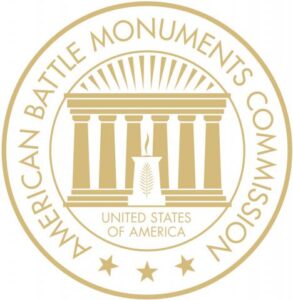Ben Brands, ABMC historian, brought ABMC’s mission closer to home on Oct. 24 for Americans during a virtual panel discussion hosted by the National Museum of the United States Army.
Arizona, California, Pennsylvania, Virginia and Kansas were some of the states represented as participants logged on to hear more about how ABMC, the National WWII Museum and National D-Day Memorial remembered the 80th anniversary of D-Day, its meaning, importance and legacy.
“Programs like this are really important for ABMC, as one of the challenges we face is that while our sites are located overseas our ultimate audience is the American public, many of whom will never get to visit Normandy or another ABMC cemetery,” Brands said.
The panelists started off discussing their respective agencies’ D-Day commemorations. Brands described the scene at Normandy American Cemetery on June 6 with more than 12,000 visitors, two heads of state and almost 200 veterans. “It’s impossible to go to an ABMC site and not be moved,” he said.
Peter Crean, vice president of education and access for the National WWII Museum in New Orleans, echoed Brands’ comment.
“I’ve been going to the American cemeteries overseas since the early 90s, and it never gets old,” he said. “You always learn something else, and you always walk away feeling better about being an American when you see the way that we recognize our war dead and how ABMC takes care of them. They’re all still serving as American ambassadors overseas.”
Panelists also discussed why D-Day still has a prominent place in American memory, the drama of the event, and the complexity of the stories associated with what is recognized as the beginning of the end of World War II.
“The drama and the tragedy is something that is hard to even wrap your mind around,” Brands said describing the landing at Omaha Beach and push to the seawall. “It’s staggering to the modern mind, even for veterans like myself who served in recent wars. The level of carnage and loss is unimaginable.”
The panelists agreed working with partner organizations is essential to keeping the stories and lessons of war in the forefront for future generations.
“If you don’t really understand the war, and you don’t understand the context of the war, you really can’t understand the world that we’re living in today,” Crean said.
To view the entire discussion, keep an eye on the National Museum of the United States Army YouTube page for the full video, D-Day at 80: A Panel Discussion on Remembrance, to be posted.
 An official website of the United States government. Here's how you know.
An official website of the United States government. Here's how you know. 